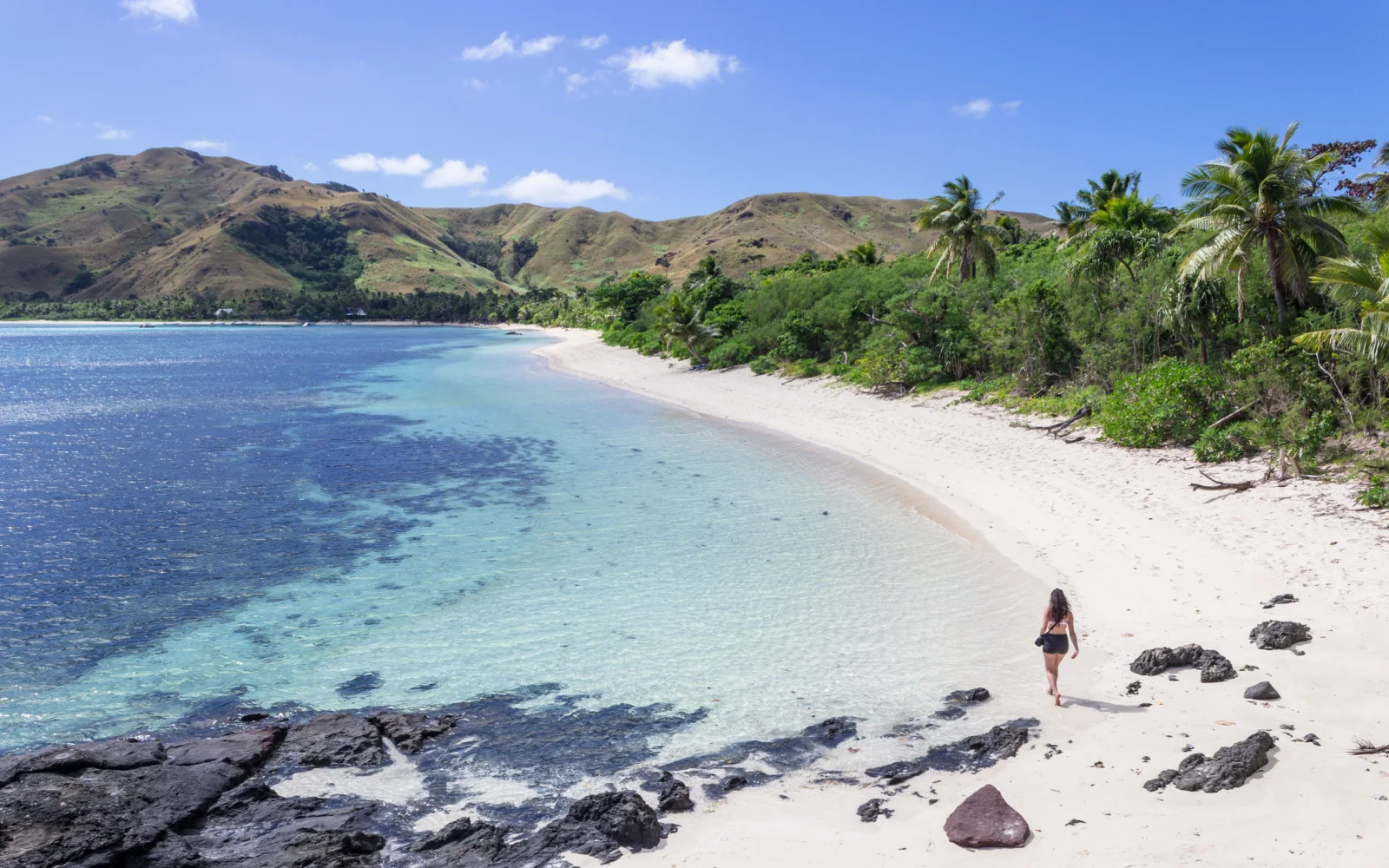Is Fiji safe to visit in 2025?
Fiji is generally safe for tourists, with most visitors enjoying their stay without incident. However, there is a high rate of petty theft, and rare cases of violent crime, including assault and sexual assault, have occurred.
Travelers should exercise normal precautions, especially in cities and at night, and be mindful of the country’s political situation and tropical weather, including cyclone season from November to April.
Fiji is a popular tourist destination known for its beautiful beaches, lush jungles, and vibrant culture. Over 1 million people make the trek to the South Pacific island country each year in search of sun, surf, and relaxation.
In addition to its beaches, Fiji offers a variety of adventure tourism opportunities, such as rafting and ziplining. Visitors can also explore the country’s diverse culture in the capital Suva or in a traditional kava ceremony.
But while Fiji is an enticing destination, is it safe to visit? Here’s our take.
Is Fiji Safe to Visit in 2025?
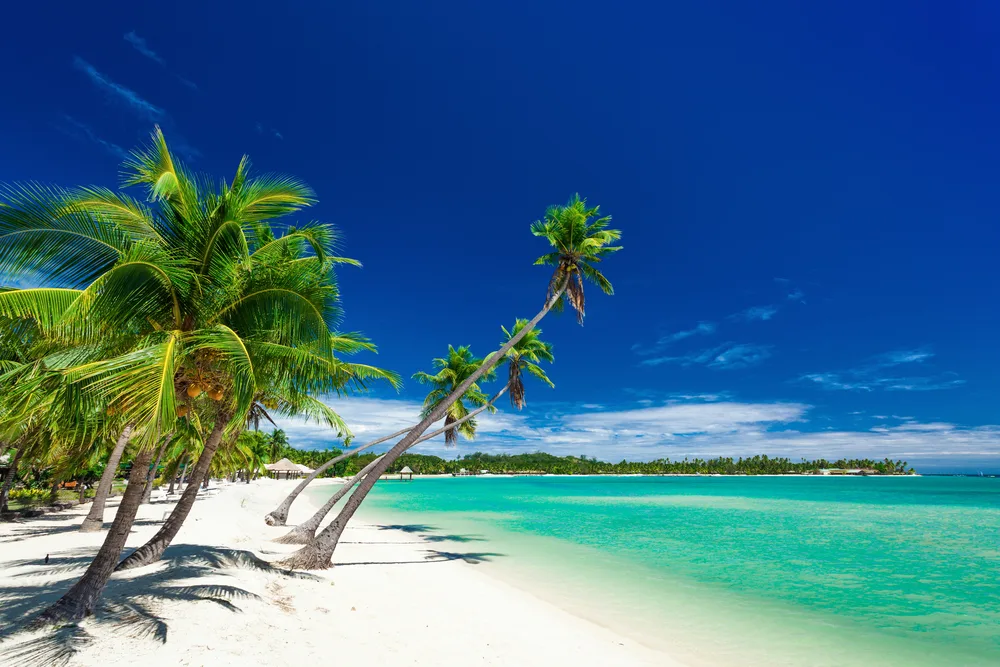
Martin Valigursky/Shutterstock
For the most part, Fiji is safe to visit, and most tourists have a good time. The one caveat is that Fiji has a high property crime rate, but most incidents are forms of petty theft.
There have been more violent incidents affecting travelers before, such as assault, but they are few and far between. A good place to start when researching the safety of a new destination is the official travel advisory issued by your country.
For example, the United States has Fiji under a Level One travel advisory, just telling travelers to exercise normal precautions.
Obviously, you shouldn’t throw all caution to the wind when you are in Fiji but use the same common sense precautions that you would at home. Some countries are a bit more cautious about their advice for Fiji.
For example, New Zealand tells its citizens to exercise increased caution in Fiji primarily due to the crime rate. Fiji does have some problems with crime, and these problems do sometimes affect tourists.
Common crimes affecting tourists in Fiji include:
- Petty theft
- ATM fraud
- Tourist scams
- Hotel room break-ins
- Robbery
- Assault
- Sexual assault
While most crimes in Fiji are petty, especially those crimes tourists are likely to encounter, some visitors in the past have been victims of violent crime. While those experiences are rare, it is important to be aware of the possibility.
Fiji does have a history of political turmoil, which is something that a few countries warn about in their travel advisory.
In 2021, there was a period of unrest in response to a law removing power from indigenous landowners, and tensions erupt sometimes due to long-standing racial and class tension.
The elections of December 2022 were disputed, but passed mostly peacefully. Although there haven’t been recent periods of unrest, it’s still a good idea to avoid any demonstrations you run into.
Finally, whenever visiting a tropical destination, it’s a good idea to prepare for tropical weather. Cyclone season in Fiji lasts from November to April and the country receives an average of seven cyclones per season.
Cyclones affect some regions of the country harder than others, such as Nadi and the Coral Coast, but you should still avoid traveling during cyclone season.
Crime in Fiji
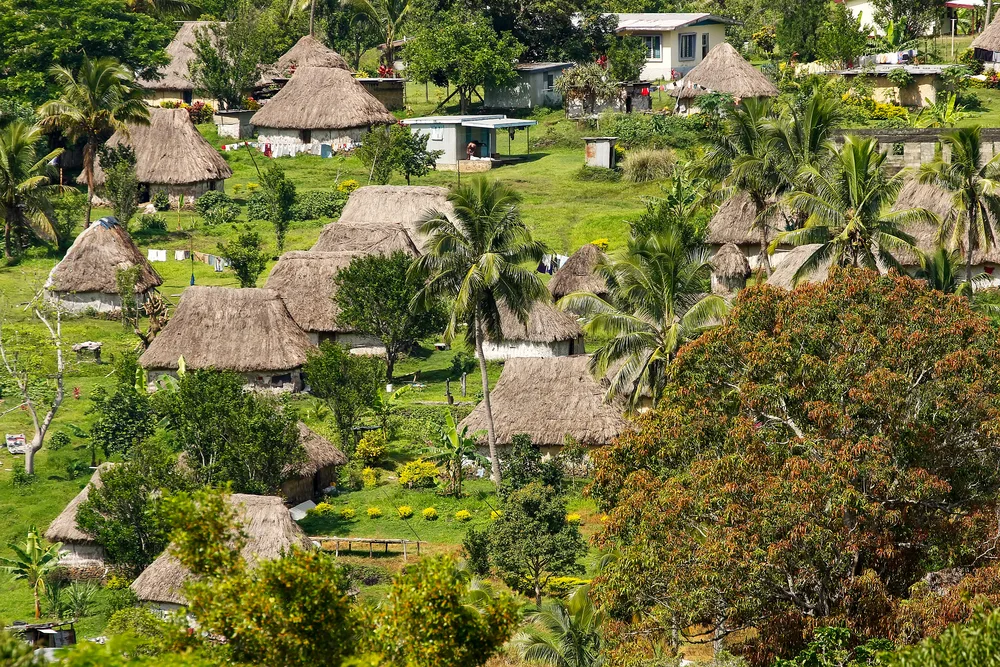
NAVALA, FIJI-DECEMBER 6: Traditional houses of Navala village on December 6, 2013 on Viti Levu, Fiji. Navala village is one of the few settlements in Fiji which maintains its traditional architecture/Don Mammoser/Shutterstock
The primary concern for people visiting Fiji, just like any new place, is crime. Crime is most likely to directly affect tourists and a brush with a criminal can seriously ruin what was once a carefree vacation.
While crime in Fiji is not a serious problem, it is present, and many tourists have had criminal encounters before. In terms of very serious forms of crime, Fiji is doing alright.
The country’s homicide rate according to World Bank data is two incidents per 100,000 people, which is very low. Besides some prostitution and drug trafficking, the presence of organized crime in Fiji is fairly low.
However, other crimes occur at much higher rates. According to the site Numbeo’s Crime Index, Fiji scores a 61.49 out of 100, which is a high value. Respondents are primarily concerned about break-ins, vandalism, theft, and corruption.
The most common crimes are property crimes. According to respondent data, the vast majority of crimes occur at night, while most feel completely safe walking around during the day.
Although Numbeo gets its data from public perception, not incident reports, it is still a good indicator of what locals say about crime. According to Fiji police reports, the most common crimes in Fiji are property crimes of which the most prevalent is theft, followed by burglary.
Several thousand incidents of theft occur a year, which is a large number considering how small the island country actually is. Of violent crimes, the most common is assault, followed by criminal intimidation and rape.
There are a few reasons why crime in Fiji is a problem. The wealth gap is the main driver of crimes, particularly theft. The average income in Fiji is 14,000 euros annually, although this dropped sharply due to the pandemic.
While this makes Fiji a middle-income country, especially compared to its Pacific neighbors, most Fijians are much poorer than foreign visitors, making petty theft very tempting.
A few years ago, Fiji was dealing with a serious substance abuse epidemic, particularly cocaine and methamphetamines. Drug-related crimes were fueling the growth in the crime rate.
While the police have cracked down on the drug trade over the past few years, drug-related crimes are still a problem in Fiji. There is some good news regarding crime in Fiji.
According to the Police Force’s 2022 report, crime was down by 7%. There was a drastic increase in drug-related offenses, which shows the police force’s higher priority in tackling the drug problem mentioned above.
While the increase in some crimes, such as robbery and motor vehicle theft, are still cause for concern, overall, the prognosis for crime in Fiji is showing signs of improvement.
You shouldn’t let the reality of crime in Fiji deter you from visiting. Rather, be mindful of precautions you may need to take, and don’t let crime ruin your vacation.
Petty Theft
The most common problem tourists encounter in Fiji is petty theft. This is common any place where there is a strong tourism economy, especially if there is a large income gap between visitors and locals like there is in Fiji.
The UK government warns its citizens about the prevalence of petty theft in Fiji. Most incidents occur in cities such as Suva or at popular tourist destinations.
The risk goes up at night but taking some basic precautions even during the day is a good idea. Thefts also occur in taxis and in Fiji’s international airports.
The best precaution against crimes of opportunity is to not give thieves the opportunities to rob you. Never leave your things unattended, even your luggage in the baggage area of the airport or your valuables in a hotel room.
Take only what you need for the day with you when you are out and about and secure the rest in a hotel or room safe.
If you are renting a car, make sure that you lock the doors and roll up the windows to prevent break-ins. ATM and credit card fraud is another common form of petty theft in Fiji according to the Australian government advisory.
Make sure that you only use secure ATMs in banks or government buildings and that the opening does not have a skimmer attached.
Protect your PIN from view as thieves either set up hidden cameras or loiter near ATMs. Always check charges on your card and withdrawals to catch fraud and cancel your card promptly.
Sexual Assault
More violent crime has happened against tourists in Fiji before. The Canadian government warns about the risk of violent crime, particularly assault and sexual assault.
Fiji is a very patriarchal society, and many women can’t work outside of the home, move around freely, or live their lives as they wish due to conservative social attitudes. Rates of gender-based violence are also high.
According to the Fiji Women’s Crisis Centre, in 2022 there were 522 cases of domestic violence, 9 cases of rape, and 41 cases of child rape. Actual rates of violence against women are probably much higher due to the stigma that comes with reporting.
While this problem primarily affects local women, foreign travelers are not protected and there have been incidents of female tourists being violently raped while in Fiji.
Although this is mostly unlikely, female tourists are almost certain to face sexual harassment and unwanted attention while in Fiji. Women traveling to Fiji will need to take some precautions for their safety.
Avoid walking around cities such as Suva and Nadi at night since that is when most crime occurs.
Pay special attention to security when choosing accommodation — it is smarter to pay a little extra money for a hotel with a security guard, good reviews, and in a secure neighborhood than to save money on your personal safety.
Avoiding Bad Areas
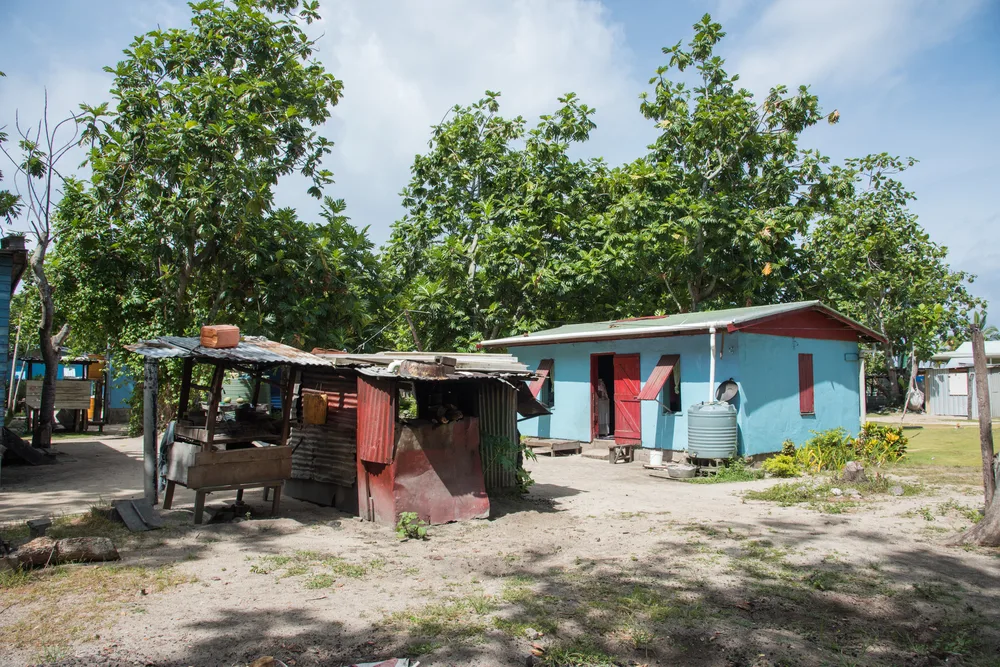
DRAVUNI ISLAND, FIJI/PACIFIC ISLANDS-NOVEMBER 29,2016: Village architecture, metal sheds and lush greenery in rural community on Dravuni Island, Fiji/EA GIven/Shutterstock
Not all of Fiji is a tropical paradise, and there are some areas that you should avoid, especially in bigger towns and cities. In the capital Suva, be careful in the downtown area at night as there are high rates of crime.
Other neighborhoods with high crime rates include Tamavua, Kamaiqa, and Namadi. Avoid these and other impoverished areas, even during the day if you are alone.
You can usually visually tell if a neighborhood feels unsafe. Other cities in Fiji such as Lautoka and Nadi also have rough areas. If you are concerned about safety, the best bet is to head out of the cities and into nature.
Frequently Asked Questions
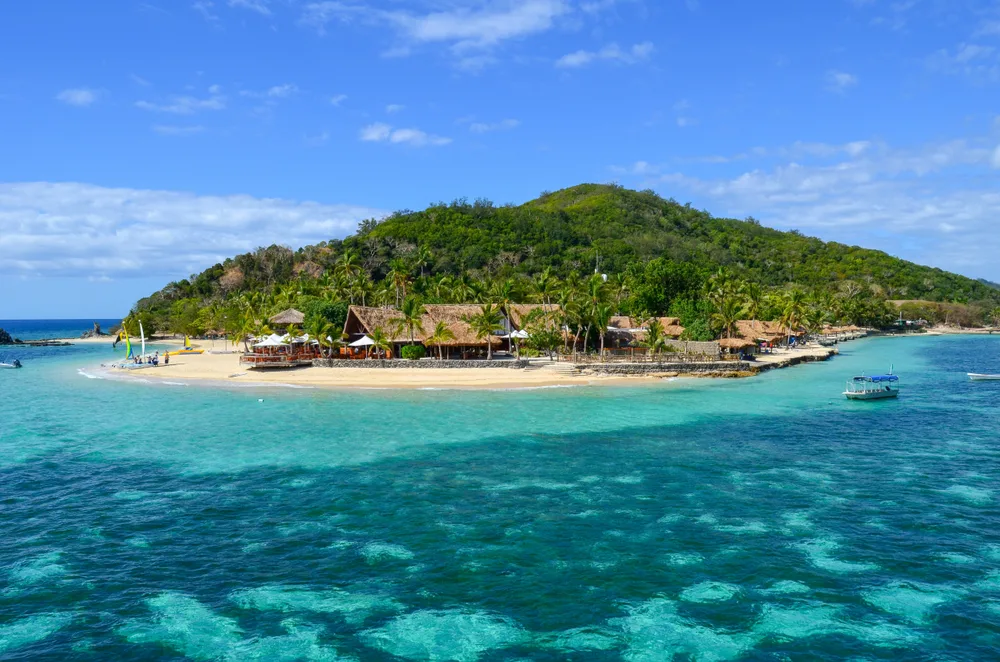
Nina Janesikova/Shutterstock
Here are some commonly asked questions from other travelers to Fiji:
Is Fiji expensive to visit?
Yes, Fiji is expensive to visit, one of the pricier destinations in Polynesia. While budgeting is possible, if you want a nice hotel, you will have to pay more money. The costs of other expenses, such as food and transportation, are also high.
Are Fiji beaches safe?
Most Fiji beaches are safe. However, some can have dangerous currents and riptides, so always ask locals before going to explore a new beach.
What should I be careful of in Fiji?
If you are passing through any of Fiji’s cities, you should definitely be careful of street crime. There are high rates of pickpocketing, bag snatching, and even hotel room break-ins.
Is malaria a problem in Fiji?
No, malaria is not a problem in Fiji. However, there are other mosquito-borne diseases, so make sure that you have insect spray.
Is Fiji travel safer than ever?
Traveling to Fiji is certainly safer than it used to be. The crime rate has steadily decreased over the past few years, and the election cycle is over, so the risk of civil unrest is lower.
So, Is Fiji Safe to Visit?
Thousands of visitors come to Fiji each year and leave with only good memories. However, you need to take precautions while you visit as crime is common, especially in the cities. So what are you waiting for — book your trip today!



